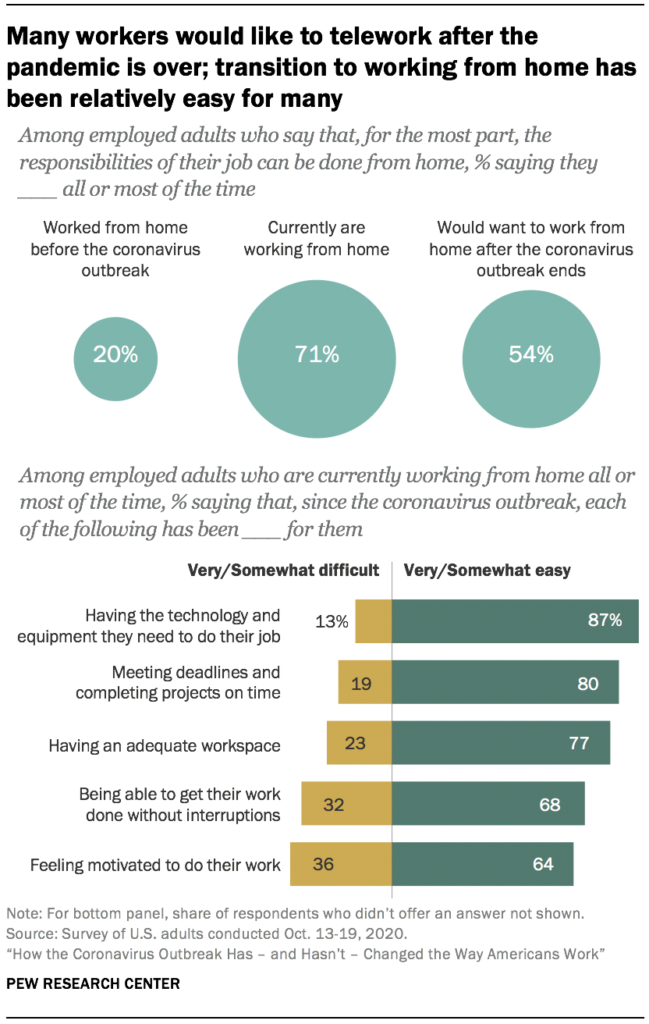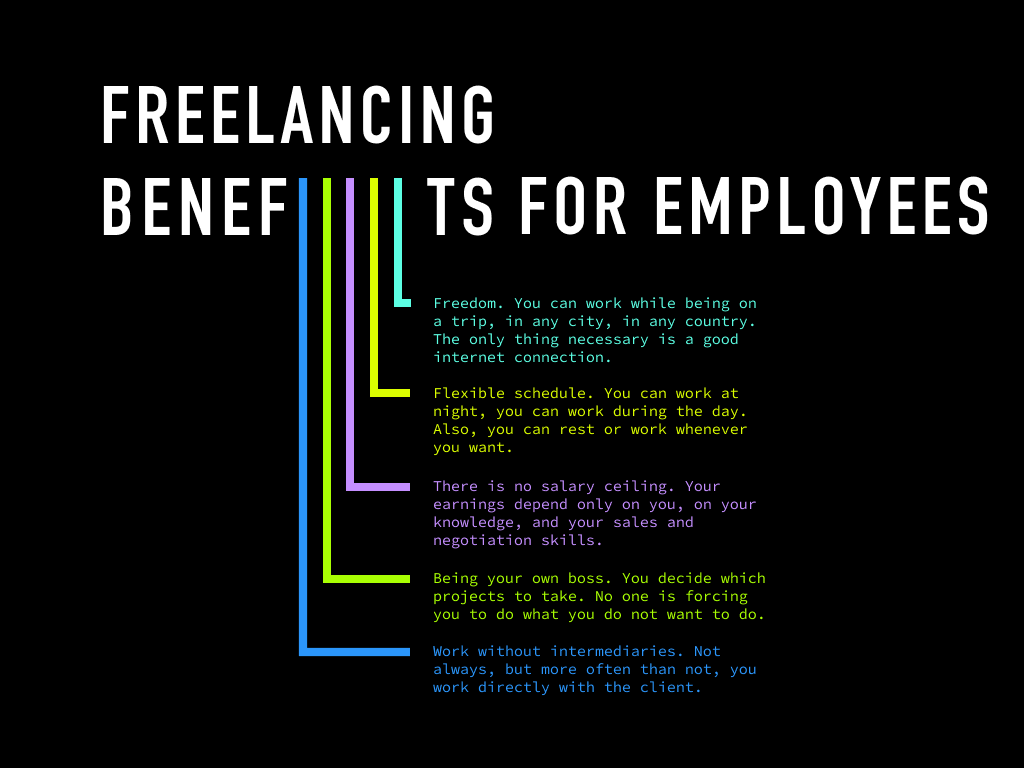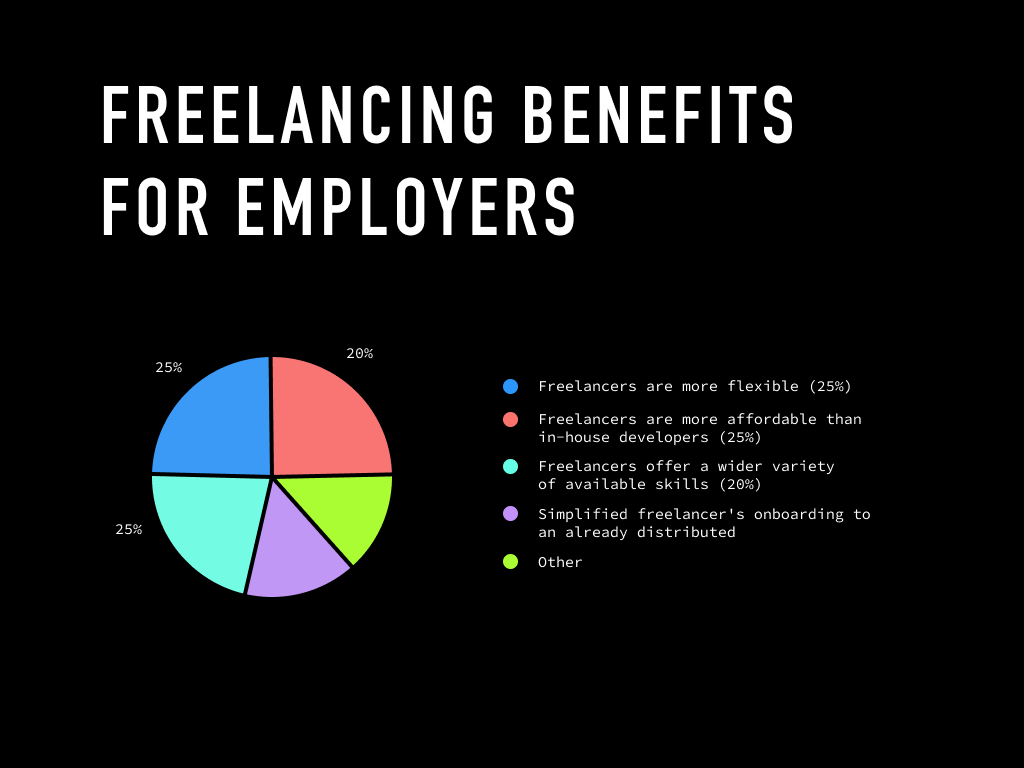The freelance market is growing every year, and this trend is observed all over the world. Performers choose the remote work to focus on the project and not be distracted by the office routine. For companies, especially startups, it is convenient to work with freelancers because they are more flexible and affordable than in-house teams.

Today’s freelance market
Today, there are around 58 million freelance professionals in the U.S. They contribute over $1.4 trillion to the country’s economy. To date, 70% of small and medium-sized businesses in the U.S. had employed freelancers at least once. Large companies also switch to hiring freelancers. This market is expected to grow to 84 million by the year 2027. This is going to make freelancers the majority workforce.
Pandemic impact
The COVID-19 pandemic has hit the labor market around the world. In May 2020, the unemployment rate reached a record high in many countries. In the United States, 14.7% of the population was unemployed while in India, the unemployment rate rose to 27.1%. As a result, millions of people on the planet are thinking about a new way of making money.
The lockdown induced by the Covid-19 pandemic also has made business owners realize the limitations of a physical workspace. There is a steady rise expected in the number of businesses moving their business online and employing freelancers in the process.
This trend is majorly supported by employees as well. In fact, 54% of employed adults want to continue working remotely after the pandemics, reports Pew Research. Half of these respondents claim they want to work 100% remotely while the rest want to be able to flexibly combine both WFH and office arrangements. The study also shows that the majority of employees found the work-from-home arrangement acceptable, and 64% of them reported that they had no problem with staying motivated and on top of their game while working from the comfort of their home.

It hasn’t always been like this. The numbers have significantly grown. For instance, before the pandemics, only around 7 million Americans worked remotely. Covid19 outbreak has drastically changed this: in 2021, at least 1 in 4 employed adults are working from home.
Not given a choice to work remotely at their current company, these employees will seek an opportunity to become freelancers.
Even when your business starts small, we know you’re thinking big. Spearhead the app revolution, beefing up your company with top tech talents — hire top engineers with us. Free yourself for greater deeds!
Why do employees and companies choose freelance?
Employees value the opportunity to plan their workday, save time and money on transportation, work without being tied to a specific city or country, and juggle several jobs simultaneously.
In the meantime, the pandemic made companies across the world adopt immediate safety measures. This has resulted in many companies implementing work-from-home policies and has led businesses to look for ways to reduce operating costs. Hiring freelancers was one of the answers.
Still, it was not a trend change, but its acceleration: even before the pandemic, businesses were slowly switching to hiring freelancers. In such a way they could rent smaller offices, while their employees felt motivated being able to plan their own time.
Freelancing benefits for employees
Employees highlight several main benefits of freelancing:
- Freedom. You can work while being on a trip, in any city, in any country. The only thing necessary is a good internet connection.
- Flexible schedule. You can work at night, you can work during the day. Also, you can rest or work whenever you want.
- There is no salary ceiling. Your earnings depend only on you, on your knowledge, and your sales and negotiation skills.
- Being your own boss. You decide which projects to take. No one is forcing you to do what you do not want to do.
- Work without intermediaries. Not always, but more often than not, you work directly with the client.

Freelancing benefits for employers
Research by Lemon.io shows that the clients name three main reasons for hiring freelancers:
- Freelancers are more affordable than in-house developers (25%)
- They are more flexible (25%)
- And they offer a wider variety of available skills (20%)
Another popular reason to turn to freelancers is working with an already distributed team which makes onboarding a freelancer much easier.

Freelancing challenges for employees
The main challenge for a freelancer is a lack of employment security. This includes:
- No stability. You don’t have a stable salary. One month you can earn a specific amount, in a month you would get half as much, and three times as much in two months.
- No vacation or sick leave.
Freelance work is often stressful. According to a survey by the British ipse association, the need to constantly search for new orders (53%) and irregular earnings (50%) have the strongest negative impact on the mental health of a freelancer. One of the main advantages, work from anywhere, also has a dark side: up to 84% of freelancers work from home and sometimes feel isolated.
Another problem is dumping. Due to a large number of freelancers (in fact, competitors), specialists sometimes have to lower prices for their services just to get an order.
Freelancing challenges for employers
In the Lemon.io survey, the companies named the top four reasons why they have never hired freelancers before:
- Not sure they can afford to hire a freelancer (18%)
- They doubt the professional skills of freelancers (14%)
- They are concerned about their intellectual property (14%)
- Alternatively, they prefer working with people who are in the same office (12%)
As we can see, the gaps in percentages between answers to this question are not large. This means, there wasn’t just one factor prevailing over others.
On the other hand, reasons like the language barrier or unsuitable time zones turned out to be the least of their concerns.
“It’s actually freelancer reliability that concerns me — when they take on too much or a project spikes they become unreliable. It’s also difficult for us to assess their technical ability” — says one of the employers surveyed by Lemon.io.
Freelancing in IT
The IT industry is among the leaders in hiring freelancers and it pays them the most. Moreover, in 2020, 12 out of the top 20 in-demand skills for freelancers were related to development. Most often, the developer’s job does not require his physical presence in the office. This means that they can work equally effectively from anywhere in the world. For the businesses, it is also better not to rent huge offices, but let their developing teams work from home. This is especially important for startups that do not always have sufficient funds.
According to Lemon.io’s survey, 83% of American companies hire freelance developers. Most of the businesses that hire freelancers prefer to hire more experienced middle and senior developers. While only 24% also work with junior devs and even fewer businesses hire architects (21%).
Freelancers vs. in-house teams
Companies have to choose between hiring freelancers or building their own in-house development team. To help them make that choice, here are some numbers from a Lemon.io study.
According to the survey, most often the respondents completely or partly agree on these statements:
- 80% consider freelancers more affordable than in-house developers. In fact, the hour rate of a freelancer might be higher, but the company doesn’t have to pay for training or onboarding. Freelancers don’t need sick pay, medical benefits, etc. Indirect costs might be almost equal to the salary itself.
- 69% think that freelancers propose a wider range of skills than in-house teams. You cannot have a specialist for each little task in your team, while you can always hire a freelancer for a short project.
- 68% are sure that freelancers are easier to manage compared to in-house teams. You wouldn’t have to invest your time and energy overlooking their every move, because they are interested in doing the project well and getting paid.
Among other concerns is security. Thus, respondents tend to believe that in-house teams are more trustworthy than freelancers:
- 52% worry that freelancers are hard to rely on. Freelancer is usually a one-person team, so any unforeseeable circumstances might make this team unavailable to a client.
- 48% afraid that freelancers are more likely to miss deadlines than in-house teams. In fact, sometimes freelancers do accept unrealistic deadlines to get a project. This issue is easily solved by transparent negotiation.
Future of freelancing
Freelancing is the future, and the further we go, the more clearly this trend is visible. More and more companies would outsource some of their business processes. According to research, 90% of Americans are open to the idea of freelance work. Younger generations are even more likely to take up freelancing.
The reasons that could make companies start hiring freelancers, according to Lemon.io’s survey:
- Positive feedback from someone I trust 41%
- I couldn’t afford a full-time developer 12%
- I couldn’t find a full-time developer 8%
Where to find a reliable freelancer
The trend of freelancing is here and businesses have to start adapting to it. Their chance is to benefit from secure platforms such as Lemon.io which help to organize freelancer-client cooperation.
According to Lemon.io’s survey, people who stated they were the happiest about working with freelancers were those who hired developers from vetted freelance platforms. 77% of respondents stated that they had a positive experience from hiring freelancers through vetted platforms, and only 2% of them had a negative experience.
Generic freelance platforms also got mostly positive reviews with 72% of positive answers. However, the share of negative experience answers was higher – 7% and the overall happiness was even lower than for those who hired freelancers based on referrals.
Lemon.io has recently conducted in-depth research on the most popular freelance platforms – and you can learn more about their advantages and disadvantages in our comprehensive guide.
Those who hired freelancers through social networks reported having the worst experiences.
“My main concern is about quality. Will I be getting the great quality that works how I need it to? I don’t know where to find freelancers that I can be assured are of great quality (for example, I stay far, far away from Fiverr, because everything you get on there is subpar, and it amounts to wasted time and money)” — says one of the employers surveyed by Lemon.io.
Conclusion
Like any other trend, freelancing will get more and more rules to make it more reliable and predictable. There will be fewer “wild” freelancers, and companies will choose vetted platforms. Those platforms will solve all typical problems of freelancing, making the cooperation beneficial for all sides.









